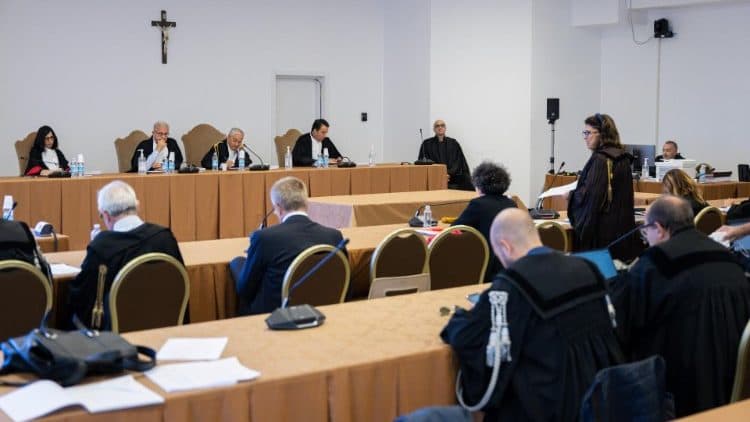ROME – As the Vatican’s “trial of the century” enters its home stretch, the ten defendants in the case, including Italian Cardinal Angelo Becciu, now are facing not only the possibility of jail time but also demands for compensation reaching close to $700 million.
Those requests have been advanced in recent days by attorneys representing the Institute for the Works of Religion, better known as the “Vatican bank,” along with the Secretariat of State and the Administration of the Patrimony of the Apostolic See (APSA), all Vatican offices considered civil parties to the trial.
In July, Vatican prosecutor Alessandro Diddi requested a total of 73 years and one month in prison for the ten defendants in the trial, who include two Italian businessmen involved in the controversial purchase of a property in London by the Secretariat of State, as well as a handful of former Vatican officials involved in the transaction, in addition to the former leadership of the Vatican’s Financial Information Authority (today the Supervisory and Financial Information Authority), which signed off on the London deal.
For Becciu, Diddi had requested seven years and three months in prison, as well as stiff fines.
This week, the three-judge panel overseeing the case heard from lawyers representing the civil parties, each of whom advanced requests for compensation related to losses allegedly sustained as a result of the defendants’ conduct.
Those lawyers included two former Ministers of Justice in the Italian government, essentially the equivalent of the Attorney General in the American system.
First up was the Vatican bank, with attorney Roberto Lipari claiming that much of the money lost on the London deal came from funds that had been donated by the bank to the pope to support the works of the Church. Lipari requested compensation in the amount of $220 million, in addition to a little over $1 million for “moral and reputational” damage to the bank.
Next it was the turn of the Secretariat of State, traditionally the most powerful department of the Vatican with an oversight role over other offices, where Becciu served as the sostituto, or “substitute,” essentially the chief of staff, when the London deal was first negotiated.
Lawyer Paola Severino, who served as Italy’s Minister of Justice from 2011 to 2013 under Prime Minister Mario Monti, asserted that the present case “is comparable to the worst scandal of corruption that led to the suicide of Robert Calvi,” referring to the notorious Vatican bank scandals of the 1970s and the early 1980s.
Severino said the Secretariat of State had asked an Italian company named Volocom, which specializes in media monitoring and news intelligence, to provide an estimate of the damage to its reputation as a result of the London scandal and the other disputed transactions in the present case. The number they arrived at, she said, was roughly $188 million, “one of the highest totals ever calculated for damages to reputation,” she said.
Severino claimed that the Volocom study had identified more than 50,000 articles on the London affair in the printed press and on-line, which, she suggested, collectively damaged the reputation of the Secretariat of State.
Severino described Becciu as having opened the doors of the Secretariat of State to the “merchants in the temple,” claiming he converted what had been a conservative investments strategy largely focused on liquid assets that could be quickly reclaimed into a far more speculative and risky approach, symbolized by a proposed oil deal in Angola that was considered but ultimately rejected in 2014.
From that point, Severino asserted, Becciu allowed a “Trojan horse” in the form of two Italian financiers, Raffaele Mincione and Gianluigi Torzi, both also defendants in the case, “to obtain for a long time unconditional and uncontested control of the patrimony of the Secretariat of State.”
On Friday, another former Minister of Justice, Giovanni Maria Flick, spoke on behalf of APSA, which by order of Pope Francis took over management of the assets of the Secretariat of State in late 2020, and which therefore absorbed the losses from the eventual sale of the London property for significantly less than the Vatican paid for it.
Flick estimated the actual losses suffered by APSA at $204 million, and also lost income on investments at $82, for a total demand for reimbursement of $286 million.
“All the facts [of this case] were aimed at creating a significant economic loss for the Holy See, with diversion or illicit use of money, embezzlement, losses in the availability of money, fraudulent conduct aimed at creating unfair profits, and also extortion and corruption and abuse of office,” Flick charged.
All told, the demands for reimbursement presented by the civil parties thus total $695 million. Flick also requested that any suspension of prison sentences for the defendants be made conditional upon paying back the sums requested.
There was, however, one bright spot for Becciu when Flick suggested that the cardinal be absolved on charges relating to funds paid by the Secretariat of State as a ransom for an Italian missionary nun who had been kidnapped by Islamic militants in Mali in 2017, and who was liberated in 2021.
Becciu had been charged with diverting those funds to a friend named Cecilia Marogna, a self-described security consultant, who allegedly inflated the amounts involved in order cover personal expenses. Attorneys for APSA suggested that charge be dropped, which Becciu’s own legal team welcomed.
Defense lawyers will have their turn beginning Oct. 5, the day after Pope Francis’s Synod of Bishops on Synodality opens, and their presentations are scheduled to finish on Dec. 6. The tribunal, led by presiding judge Giuseppe Pignatone, is expected to render verdicts shortly afterwards, before the end of the year.













